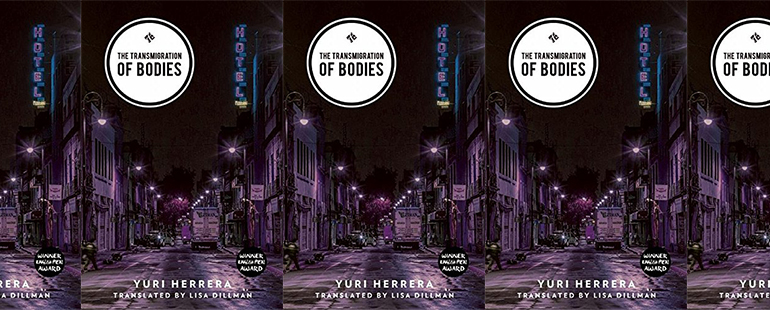Reading The Transmigration of Bodies

I was sitting by the levee when I started reading Yuri Herrera’s The Transmigration of Bodies. I wasn’t trying to read another pandemic book. The pandemic has fatigued me more and more of late. The isolation, the death counts sent to my phone every morning, the anxiety of unwittingly spreading the virus in the grocery store and killing someone. Writing this down makes it sound so surreal; this is a reality I didn’t foresee for us last February. When I started reading The Transmigration of Bodies I wanted to get my second dose of the COVID-19 vaccine and feel different, feel relieved. I wanted us all to get our second dose at the same time and dance on the levee and pass bottles of rum, to share all the hugs we’ve been missing. That was my dream a little over a year ago today. It was a dream that faded with every mass shooting, with every detail shared in the trial of Derek Chauvin that made us relive his murder of George Floyd, with these bits of the world greeting us back to the old normal that never should have been that normal to begin with.
A lot of people read dystopian literature, or sci-fi, or fantasy, or any surreal genre, as escapism. But a lot of these stories, by having a world so different, paradoxically teach us about our current world. As I read a book written in 2013 about a dystopian pandemic, it was amazing to see the similarities between what Herrera had fabricated and our current reality. He was almost prescient. The empty streets, the indifference to the loss of life, the masks. It was striking to read a story that was set during a plague when the whole world is steeped in a pandemic. The Transmigration of Bodies follows the main character, the Redeemer, as he tries to “fix” situations in the underbelly of an unnamed city during the early stages of a plague. Throughout the novel, he ping-pongs back and forth between his home and that of two mafia families, each having been accused of kidnapping the kin of the other, and each trusting the Redeemer to get their son, their daughter, back safely. In classic noir style, each character helps showcase the Redeemer and the world he lives in. And in each character, each setting, I saw more and more the world we are living in, and the world we will all be returning to.
I sat on the levee, reading how the Redeemer was most worried about “not knowing what to fear.” How before the pandemic “you could trust that when you opened the door every morning the world wouldn’t be emptied of people.” I sipped a coffee, staring at the river, book on my lap. I thought about how I want to share this moment, this river with so many of my peoples back home. I thought of how so few of us have seen this river, and I thought of all the people I can share this river with, and of all the people I can’t share this river with. I sat alone on this empty levee that I had dreamed of filling up with all my friends when this was over and thought about how the pandemic has just heightened the issues for us. I sat there thinking about the idea of this virus as barium sulfate, the liquid you drink before a CT scan that lights up your systems so that you can see what’s wrong with them. I sat there thinking of how the people discounting the virus are using the same arguments to deny the existence of racism, or the patriarchy, or homophobia, or anybody’s rights that aren’t tied to the people who have been in the driver’s seat of this country for over 400 years. We have over 500,000 deaths in this country from COVID-19, yet people make up stats on .1% fatality rates—like that somehow erases the 500,000 deaths. Like if people who don’t know how to slide a decimal point when calculating percentages have the right to erase those who have died due to our collective failure as a society.
The Redeemer has a “black dog” that follows him. The dog is there throughout the book, haunting and hanging around him. I wonder how isolating has helped and hidden my own traumas, has helped or hidden the traumas and sins of this country for the year. Those traumas have colored so much of my time isolating this past year. As I sat on the levee, I thought of a news report I heard on the Derek Chauvin trial. Again I heard the details about the murder, I heard the testimony of witnesses. Witnesses who cry, who say they still are haunted by not having been able to save Floyd. I wonder how many people are haunted by witnessing Floyd’s death. I wonder how many people whose names we don’t know haunt us as a collective as well.
I can’t hear about the trial and not see Floyd lying on the street, gasping for breaths that never come. I can’t visualize him on the street without thinking of my own black dog, of the survivor’s guilt that haunts me. I think of how I watched my best friend get killed in an accident when we were nineteen, and I think of the fear that I played some part in this death, that if I had done a thing different here or there, he would have been saved. I think of how I worry that I’m not doing enough. Am I another bystander, like those witnesses, doomed to be haunted by the possibilities I never fulfilled? I think, sitting on that levee alone, how my barium sulfate has shown how no matter how far I’ve come out of that depression, I still struggle. How every grocery store visit, how every everything, is tied to my fear of asymptomatically killing someone, everyone, of not doing enough to save our peoples. I think of one of my elders in New Orleans, my old neighbor, who died a few weeks after Mardi Gras last year. I think of how I saw him that Mardi Gras day, and wonder whether it was my hug, my rum, that killed him. I think about the Walgreens clerk who died in my neighborhood and wonder if my breath, slipping through my mediocre early-pandemic mask, killed her. I wonder if my existence just aids in hurting people, in killing people. Is my presence a black hole within my community? Am I nothing but a haunted bystander sentenced to relive the traumas we’ve survived?
As the sun started to set over the levee, I re-entered the world of the novel. After a woman is killed, the Redeemer wonders “who will bury that girl? . . . Because it won’t be them, those who wept so much and threatened so much, they won’t be the ones to dig in her grave. When did we stop burying those we love with our own hands?” In the novel, there has been more and more death, and the living continue to be more and more desensitized to it, more and more callous, and more and more they seem unable to honor those who have passed. We’ve barely gotten a third of the U.S. adult population vaccinated, and people are driving across the entire eastern coast of the United States just to shoot people of color when they “have a bad day.” I wonder how many bad days he created with his own bad day, and how many people he haunts like a black dog that will never go away. I wonder if I or people I love will be on the other side of someone’s bad day, right when we expect to be celebrating the world again.
The sun setting, I made a cocktail for myself, then read how the Redeemer goes to a popular strip club to visit a friend who has seen the missing son of the mafia. The Redeemer watches the debauchery, ashamed of wearing his mask, and offers his friend some masks, who says, “Everything’s of use to me here.” I read the scene where a stripper dances with nothing but a facemask on, and I thought of my peoples back home in Florida, under the rule of Governor Ron DeSantis, and how he has tried to make it illegal to mandate masks. I think of my peoples still working service industry back home in Miami, how so many of us who still work service industry struggle with our demons. I think of how so many of them watch as people drink and cough and laugh and spray shit all over the place while they work for below minimum wage, and what that does to their/our own personal views of our self-worth. I think of how we see people allowed to take their mask off if they have a drink and how it helps us put the bottle back to our mouths in ways where the bottle takes more from us than we ever took from them.
The issues of self-worth were always there for us in this industry, as every person we come into contact with dictates how much we get paid that day. So many of us are paid under the table, and while the narrative is that we don’t pay enough in taxes, the flip side of that coin is we get no benefits, is that most of us don’t even know what we make, so it’s easier to lose it all at the next bar, with the next dealer, buying our meals since we were at home during the hours most prep and cook, and not realizing the money we are throwing away. I haven’t worked in my service industry job in a year, and even though I have the best bar gig I could ever dream of having, I still have those worries, those doubts, of what it will be like when I first come back to work.
At the end of The Transmigration of Bodies, the Redeemer stares at the stars, before going back out to fix another situation. As a country, we watch as the Chauvin trial brings up the trauma and terror of what happened last summer, what happens over and over again every summer, every autumn, every winter, every spring. I think of how we will all have to do our part to fight that beast. Just like how I know I still will mourn the parts I played in the deaths of people I’ve loved, and still will hope to keep their stories alive, and still will try to keep as many of us alive to tell our own stories as I can.
Near the end of the novel, the Redeemer thinks how “these days we walk past a body on the street, and we have to stop pretending we can’t see it.” As I wait for my second vaccine dose, so I can work again, so I can see some more people, so I can breathe just a little easier, I prepare myself, knowing that we won’t be filling up the levee with all our friends, drinks, hugs, and dreams, but that we will slowly fill up the city again. As we walk those familiar streets, though, maybe we have to stop when we notice the absences, and we have to stop pretending like we don’t feel it, miss it. Without that collective awareness, we will have lost even more, forever. The old normal should have never been normal; we have to keep redeeming ourselves, for each other, for ourselves, for the black dogs that won’t let us be bystanders.
This piece was originally published on April 13, 2021.



